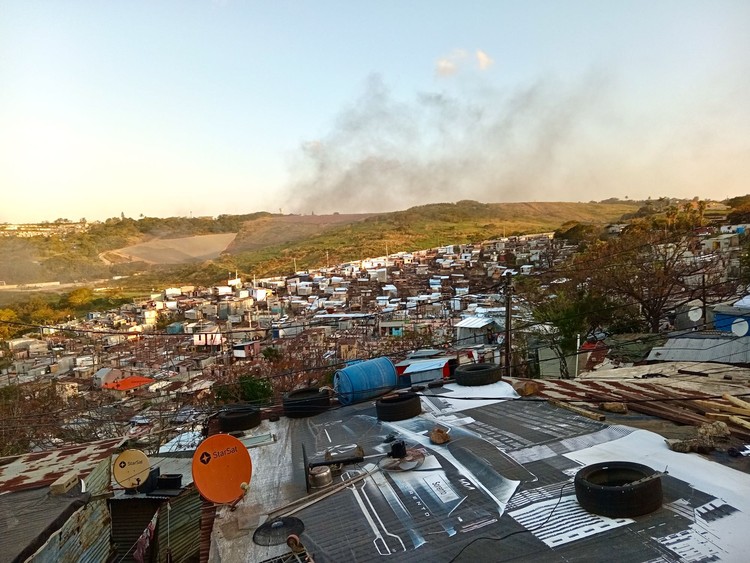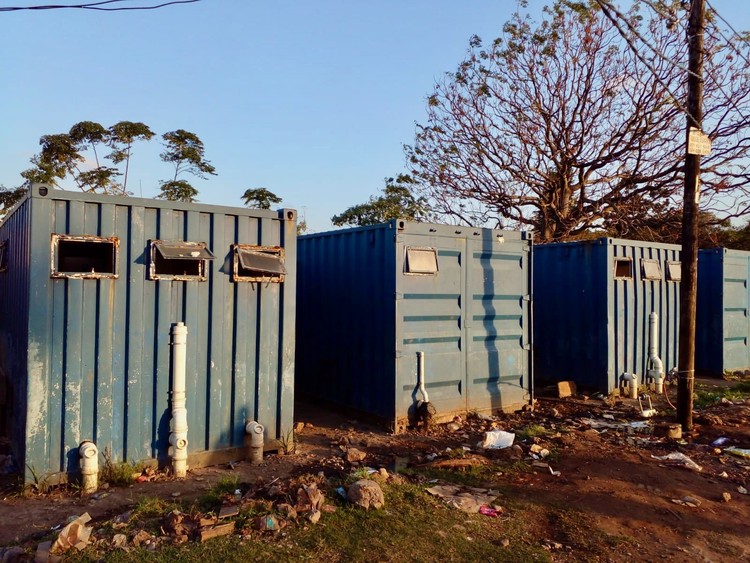1,500 families share three toilets in Durban informal settlement
Nearly 40 blocked toilets have not been fixed after two years
1,500 families are forced to share three blocked toilets in Kennedy Road informal settlement. Photos: Manqulo Nyakombi
- Nearly 1,500 families in Kennedy Road informal settlement in Durban are using the bush as a toilet.
- There are about 40 flush toilets, but all but three are blocked and have not been fixed for two years.
- The municipality says it is tied up with bureaucratic processes.
Nearly 1,500 families in Kennedy Road informal settlement, Durban, have to share three working toilets. There are about 40 flush toilets in the settlement but almost all of them are blocked.
Ward 25 Councillor Themba Mkhize (ANC) said for the past two years the municipality has been promising to fix the toilets. At a council meeting held two months ago, a budget to fix the blocked toilets was approved, he said, but nothing has happened.
Mkhize said it was already an issue before the April 2022 floods.
“I’m not lying when I say I reported these blocked toilets two years ago,” he said.
“On many occasions the municipality has sent people to come and assess them but nothing was done. Each time when they visit, we calculate the number of blocked toilets; they take the number; then promise to come back to fix them. But that does not happen. Instead, we keep on calculating,” said Mkhize
“Most residents are using the bush, while others have decided to dig holes in their backyards. The bush is very dangerous, because there are live wires [illegal electricity connections]. It’s God’s grace that no one has died in those bushes,” said Mkhize.
Resident Sifiso Magwaza said they no longer bother reporting the blocked toilets.
“We are only relying on three toilets. The three toilets are in one container. We all queue in one line – kids, men and women … Some people are using buckets then throwing them in the drain but the majority are using the bushes,” he said.
Magwaza said the last time he was aware that the toilets were fixed was three years ago.
“In most cases, when fixed they would only work for a week or two. We would then be left with three or two toilets to share. It’s been years now waiting for the municipality to come fix them, and we are not protesting we are just waiting,” said Magwaza.
“The issue we are facing is that the municipality is not hiring the big contractors that can solve this problem from the roots,” said Mkhize. “In some informal settlements where blocked toilets were fixed before, they only lasted a week.”
EThekwini Municipality spokesperson Gugu Sisilana said the municipality is aware of the situation. She said the budget for maintenance was reallocated to prioritise storm damage projects, such as treatment works and pump stations, after the April or May floods in 2022.
She said a two-year tender aimed at addressing this issue is being processsed. In the interim, the municipality is busy with other paperwork to “allow us to start working”, she said.
“We urge communities to refrain from using foreign materials instead of toilet paper as this in turn impacts on the lifespan of the ablution facilities,” said Sisilana.
Blocked toilets reported two years ago have still not been fixed
Support independent journalism
Donate using Payfast

Don't miss out on the latest news
We respect your privacy, and promise we won't spam you.
Next: Residents of Afrikaner enclave want to be integrated into City of Tshwane
Previous: Security workers protest in Boksburg over unpaid wages
© 2023 GroundUp. This article is licensed under a Creative Commons Attribution-NoDerivatives 4.0 International License.
You may republish this article, so long as you credit the authors and GroundUp, and do not change the text. Please include a link back to the original article.
We put an invisible pixel in the article so that we can count traffic to republishers. All analytics tools are solely on our servers. We do not give our logs to any third party. Logs are deleted after two weeks. We do not use any IP address identifying information except to count regional traffic. We are solely interested in counting hits, not tracking users. If you republish, please do not delete the invisible pixel.


